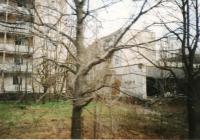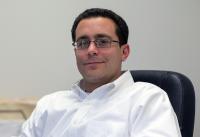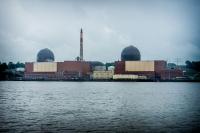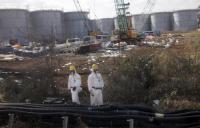-
Belarus’s lax approach to nuclear safety raises fear of another Chernobyl

Thirty years after Chernobyl, the world’s worst nuclear accident, a series of mishaps at a nuclear facility in Astravets, in Belarus, has raised concerns over nuclear safety, especially in neighboring Lithuania. Vilnius, the country’s capital, is located less than thirty-one miles from Astravets. Lithuania, accusing Belrus of Soviet era-like lack of transparency, says it would work with the international community to block the Astravets plant coming online.
-
-
Melting ice sheet could release frozen cold war-era radioactive waste
Camp Century, a U.S. military base built within the Greenland Ice Sheet in 1959, was decommissioned in 1967, and its infrastructure and waste were abandoned under the assumption they would be entombed forever by perpetual snowfall. But climate change has warmed the Arctic more than any other region on Earth, and as portion of the ice sheet covering Camp Century melt, the camp’s infrastructure will become exposed, and any remaining biological, chemical, and radioactive waste could re-enter the environment.
-
-
In dirty bomb prevention, Texas fails a crucial test
The clandestine group’s goal was clear: Obtain the building blocks of a radioactive “dirty bomb” — capable of poisoning a major city for a year or more — by openly purchasing the raw ingredients from authorized sellers inside the United States. It should have been hard. The purchase of lethal radioactive materials — even modestly dangerous ones — requires a license from the Nuclear Regulatory Commission, a measure meant to keep them away from terrorists. But a team of undercover bureaucrats with the investigative arm of Congress discovered that getting a license and then ordering enough materials to make a dirty bomb was strikingly simple.
-
-
Studying the basic science of nuclear waste
Approximately 300 million liters of highly radioactive wastes are stored in hundreds of underground tanks at the Hanford Site in Washington and the Savannah River Site in South Carolina. These wastes are extremely complicated mixtures of salts and sludges that have been exposed to ionizing radiation for decades. Their chemistry is dominated by interactions at solid-liquid interfaces that are poorly understood. A more thorough understanding of the chemistry of radioactive waste is key to treating this unwanted byproduct of winning the Second World War and the cold war.
-
-
Fukushima and the oceans: What do we know, five years on?
A major international review of the state of the oceans five years after the Fukushima disaster shows that radiation levels are decreasing rapidly except in the harbor area close to the nuclear plant itself where ongoing releases remain a concern. At the same time, the review’s lead author expresses concern at the lack of ongoing support to continue the radiation assessment, which he says is vital to understand how the risks are changing.
-
-
Laser uranium enrichment technology may create new nuclear proliferation risks
A new laser-based uranium enrichment technology is based on a new uranium separation concept, which relies on the selective laser excitation and condensation repression of uranium-235 in a gas. Experts worry that this new enrichment technology may provide a hard-to-detect pathway to nuclear weapons production.
-
-
Scanners more rapidly and accurately identify radioactive materials at U.S. borders, events

Among the responses to the 9/11 terrorist attacks, DHS, among other things, has increased screening of cargo coming into the country. At MIT, the terrorist attacks gave rise to a company dedicated to helping DHS — and, ultimately, other governments and organizations worldwide — better detect nuclear and other threats at borders and seaports. Today, Passport — co-founded in 2002 by MIT physics professor emeritus William Bertozzi — has two commercial scanners: the cargo scanner, a facility used at borders and seaports; and a wireless radiation-monitoring system used at, for example, public events.
-
-
U.S. court asked to block restart of aging, damaged Indian Point nuclear reactor

Friends of the Earth and other environmental organizations have filed an emergency petition with the United States Court of Appeals for the District of Columbia Circuit asking that the court compel the Nuclear Regulatory Commission to prevent Entergy from restarting an aging Indian Point nuclear reactor which was found to have unprecedented parts failure in its critical core cooling system. Entergy, the owner and operator of Indian Point, has repeatedly stated that it intends to start the reactor within days. The Indian Point reactors’ licenses expired in 2013 and 2015, respectively, and the plant is operating beyond its 40-year life span while the NRC considers whether to extend the license for an additional twenty years.
-
-
New material promise to make nuclear fuel recycling cheaper, cleaner
Researchers are investigating a new material that might help in nuclear fuel recycling and waste reduction by capturing certain gases released during reprocessing. Conventional technologies to remove these radioactive gases operate at extremely low, energy-intensive temperatures. By working at ambient temperature, the new material has the potential to save energy, make reprocessing cleaner and less expensive. The reclaimed materials can also be reused commercially.
-
-
Number of thyroid cancers in Belgian children rises post-Chernobyl
Thyroid cancer is usually rare among children, with less than one new case per million diagnosed each year. Exposure in Belgium to radioactive fallout from the April 1986 Chernobyl nuclear accident may have increased the incidence of thyroid cancer in those exposed as children.
-
-
Fukushima’s lesson: Better real-time monitoring of spent fuel pools is a must

The 2011 Fukushima Daiichi nuclear accident should serve as a wake-up call to nuclear plant operators and regulators on the critical importance of measuring, maintaining, and restoring cooling in spent fuel pools during severe accidents and terrorist attacks, says a new report from the National Academies of Sciences, Engineering, and Medicine.
-
-
Decommissioning Fukushima: Mapping boron distribution in molten debris
Decommissioning the Fukushima Daiichi Nuclear Plant just got one step closer. Japanese researchers have mapped the distribution of boron compounds in a model control rod, paving the way for determining re-criticality risk within the reactor.
-
-
Measuring electromagnetic radiation exposure
Society demands continuous implementation of new transmission systems due to ongoing development of communication technologies. These systems work by emitting electromagnetic waves. As a result, population is exposed to a significant increase of environmental radiation levels. Researchers from UPM have developed a portable device that allows continuous monitoring the exposure levels to electromagnetic radiations of a person who wears such device.
-
-
What we learned from Chernobyl about how radiation affects our bodies
The world has never seen a nuclear accident as severe as the one that unfolded when a reactor exploded in Chernobyl on 26 April 1986, sending vast amounts of radiation into the skies around Ukraine, Belarus and Russia. The planet had experienced massive releases like this before, in the bombings of Hiroshima and Nagasaki in 1945. But Chernobyl-related radiation exposure had a more protracted character. It was the first time in history that such a large population, particularly at a very young age, was exposed to radioactive isotopes, namely iodine-131 and cesium-137, not just through direct exposure, but through eating contaminated food as well.
-
-
More money for nuclear safety pledged on Chernobyl 30th anniversary
The EU and other global donors have pledged an additional $99 million to help secure the Chernobyl power plant, as ceremonies in the Ukraine mark thirty years since the disaster. The money will be used to construct a new spent nuclear waste storage facility, adding to the €2 billion already donated to helping clean up and secure the Chernobyl site. A new giant $1.7 billion steel structure will be placed over the nuclear reactor this year to prevent further radioactive leaks. The old concrete structure was put together after the meltdown, but experts say it is not leak-proof and that, in any event, it is beginning to show its age.
-
More headlines
The long view
Keeping the Lights on with Nuclear Waste: Radiochemistry Transforms Nuclear Waste into Strategic Materials
How UNLV radiochemistry is pioneering the future of energy in the Southwest by salvaging strategic materials from nuclear dumps –and making it safe.
Model Predicts Long-Term Effects of Nuclear Waste on Underground Disposal Systems
The simulations matched results from an underground lab experiment in Switzerland, suggesting modeling could be used to validate the safety of nuclear disposal sites.
